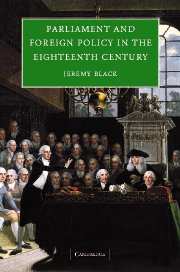Book contents
- Frontmatter
- Contents
- Preface
- Note on dates, spelling and titles
- List of abbreviations
- 1 Introduction
- 2 The Revolution Settlement, Parliament and foreign policy, 1689–1714
- 3 The Walpolean system, Parliament and foreign policy, 1714–42
- 4 The mid-century crisis, Parliament and foreign policy, 1742–60
- 5 George III, Parliament and foreign policy, 1760–1800
- 6 Sources and reports
- 7 Character and quality of parliamentary discussion
- 8 A parliamentary foreign policy?
- 9 Conclusions
- Select bibliography
- Index
4 - The mid-century crisis, Parliament and foreign policy, 1742–60
Published online by Cambridge University Press: 22 July 2009
- Frontmatter
- Contents
- Preface
- Note on dates, spelling and titles
- List of abbreviations
- 1 Introduction
- 2 The Revolution Settlement, Parliament and foreign policy, 1689–1714
- 3 The Walpolean system, Parliament and foreign policy, 1714–42
- 4 The mid-century crisis, Parliament and foreign policy, 1742–60
- 5 George III, Parliament and foreign policy, 1760–1800
- 6 Sources and reports
- 7 Character and quality of parliamentary discussion
- 8 A parliamentary foreign policy?
- 9 Conclusions
- Select bibliography
- Index
Summary
The rights of Parliament in the sphere of foreign policy had been extensively discussed during the Walpole years as part of the working out of the Revolution Settlement, and as the opposition reacted to the longevity of the Walpole ministry and to its association with unpopular policies. The constitutional issue was far less present in mid-century, as there were no novel issues to address, although in Scotland the process of amending the terms of the Union continued. In Britain, the fall of Walpole in 1742 was not followed by the political and institutional changes discussed at various times by his opponents. Furthermore, there was no issue of royal prerogative and parliamentary competence comparable to that raised by the territorial cessions at the close of the American War of Independence in 1783. Foreign policy, however, was still a major topic of parliamentary and press contention.
Prior to the death of George II in 1760, the major fault line in the struggle over foreign policy again lay not, as sometimes suggested, between government and people, however defined and represented, with Parliament managed by the former but open to the arguments of the latter, but, rather, within the government. The struggle focused on the apparent needs created by the Hanoverian commitment.
The problems of managing the Commons also reflected the less than clear-cut nature of party allegiances, the consequences of the divided nature of the Whig inheritance, and the limited extent of partisan cohesion and discipline among parliamentarians.
- Type
- Chapter
- Information
- Parliament and Foreign Policy in the Eighteenth Century , pp. 78 - 98Publisher: Cambridge University PressPrint publication year: 2004

